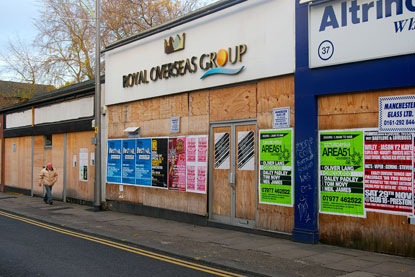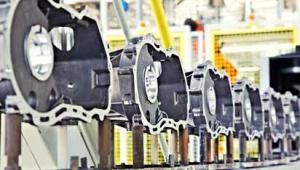By Richard Johnstone | 25 April 2012
Gross domestic product shrank by 0.2% in the first quarter of this year, the second consecutive quarter of contraction, putting the UK back in recession.
 Preliminary estimates from the Office for National Statistics show that output fell by 3% for the construction sector and by 0.4% for the production sector, including manufacturing. Service sector output increased by 0.1% in the same period.
Preliminary estimates from the Office for National Statistics show that output fell by 3% for the construction sector and by 0.4% for the production sector, including manufacturing. Service sector output increased by 0.1% in the same period.Following the 0.3% fall in the last quarter of 2011, the figures mean that there has been no net economic growth in the UK since the first quarter of 2011.
The ONS report stated that construction output for the quarter was based on estimates for the third month, March, which might be changed when the actual information on work undertaken is available.
Andrew Goodwin, senior economic adviser to the Ernst & Young Item Club, said there was ‘disbelief’ with the figures, which ‘do not fit with our experience of the market’.
He added: ‘The construction figures are an obvious source of bewilderment, as they have been throughout the past few years. When you have the Purchasing Managers Index survey telling us that the sector is growing at rates well above the long-term average, but the official data tells us that output has fallen by 3% on the quarter, there is clearly a major problem.
‘But it isn’t just the construction data – the services data also looks highly questionable.I would be very surprised if these figures were not revised upwards substantially, although history tells us that this process may take a while.’
Azad Zangana, European economist at asset management firm Schroders, agreed that the figures would be questioned ahead of any possible revisions.
He added: ‘There is room for revisions to these numbers given that they are early estimates, although we doubt they will be large enough to make this double-dip go away.
‘We have been forecasting another recession since last November when the eurozone crisis intensified. Indeed, we are forecasting a further fall in GDP for the second quarter, which will be caused by the extra bank holiday to celebrate the Diamond Jubilee.’
He said it would be ‘remarkable’ if the Bank of England does not undertake more quantitative easing when the current £50bn programme of asset buying ends next month.
Tony Dolphin, senior economist at the Institute for Public Policy Research, said the announcement was ‘a further blow for the government’s reputation for economic competency’.He added: ‘Today’s figures mean the economy has grown by just 0.4% since the second quarter of 2010, when the coalition embarked on its deficit reduction programme. [The government] promised that, thanks to so-called expansionary fiscal contraction, the private sector would rush to fill the gap created by higher taxes and cuts in public spending. As its critics pointed out at the time, this was a hopelessly optimistic view.’
Trades Union Congress general secretary Brendan Barber said the figures showed the government’s austerity plan wasn’t working.
He said: ‘This is worse than expected. There has been no growth over the last year, and the economy is 0.5% smaller than six months ago.
‘The government should look across the Atlantic and follow President Obama’s alternative that has reduced unemployment and brought growth back to the US.’
Alison Garnham, chief executive of Child Poverty Action Group, observed that the recession ‘had never gone away’ for many families. They had endured rising living costs, job losses and wage freezes in the past few years, she said.





















